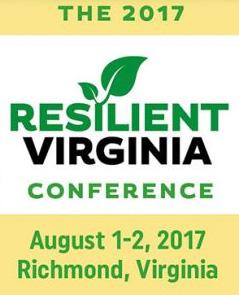 For the second year, our Resilient Virginia Conference was a great success, bringing together state, local, and national leaders to share know-how and inspire further efforts toward local resiliency actions. Conference participants shared these comments:
For the second year, our Resilient Virginia Conference was a great success, bringing together state, local, and national leaders to share know-how and inspire further efforts toward local resiliency actions. Conference participants shared these comments:
“Amazing to see such a gathering in Virginia!”
“Well worth attending for the diverse topics, people, and interactions!”
“A truly fantastic event!”
We are pleased that Governor Terry McAuliffe kicked off the event with a statement about the importance of holding the second Resilient Virginia Conference. You can view his statement here.
You will also be able to revisit the insights provided by national and state-level experts in the Plenary Sessions, as we will be including their presentations on our website in video format. Led by Secretary of Public Safety and Homeland Security Brian Moran, conference speakers addressed resiliency perspectives from the national level as well as sharing lessons learned from Louisiana and Colorado. The Lunch Plenary Panel provided insights into the economic value to both governments and corporations of adopting resiliency in policies and operations. In addition, Day Two Plenary Session speakers provided highlights of the 100 Resilient Cities Planning Process and the NIST Community Resilience Planning Guide, and the final Lunchtime Plenary Panel included state elected officials who shared their thoughts on moving Virginia forward toward a comprehensive resiliency plan.
We will also be sharing the Breakout Session presentations that included a wide range of topics, which can be reviewed on the conference website.
Secretary Moran provided his own summary of why resiliency needs to be addressed in a collaborative fashion, in forums such as the Resilient Virginia Conference, when he observed that “Resilience ultimately is our ability to keep our fundamental resources — water, air, land, and critical infrastructure — safe and usable for our communities, for generations to come.”
We thank Secretary Moran, the Virginia Department of Emergency Management, Dominion Energy, and all our Sponsors, Exhibitors, Partners, and Planning Committee Members for working to make the 2017 Resilient Virginia Conference a memorable event.
Annette Osso, Managing Director, Resilient Virginia
August 2017




